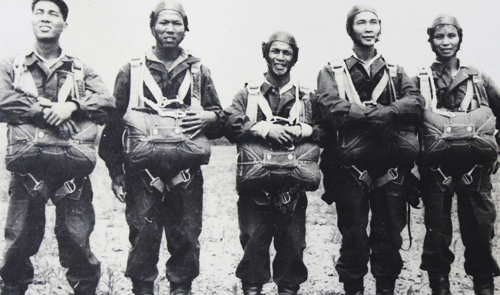Brigade 305 is the first and unique paratroop unit of the Vietnam army, which was established in early 1961 and terminated its missions seven years later during the war against the US.
Part 1: The first and only paratroop unit of the Vietnam armyPart 2: Vietnam paratroops train in China, work in LaosPart 3: Paratroop unit defends the sky of VietnamPart 4: Airdropping supplies during a dangerous mission in Hue
The airborne unit bore many challenges and achieved glorious feats but few people have even heard of the special force.
The selection of staff
Senior lieutenant general Nguyen Nam Khanh, 86, recalled a day in early 1961 when he and lieutenant colonel Nguyen Chi Diem were ordered to meet deputy chief of staff Le Trong Tan to be assigned a new mission.
“After planning, the High Command decided to set up a parachuting arm to defend the northern region and assist the battlefields in the south. ‘This is definitely a new arm,’” Khanh recalled Tan as saying.
Actually, preparations for the establishment of the brigade were made in 1958 when dozens of qualified men were selected after a health check-up at the Army Medical Institute 108 in Hanoi and sent to China for training. As soldiers of other armies, they were already hardened by war before joining the airborne unit.
After half a century, some of the soldiers of the paratroop unit are now in their 70s and 80s but still remember vivid details of the past. Khanh, who passed away this week in Hanoi, was the first political commissar of Brigade 305 based on Voi Street in Lang Giang District, Bac Giang Province in the north.
“I remember the unit included captain Tran Tham, senior lieutenant Bui Duy Trinh, and warrant officer Vu Minh Ngoc who took part in the Dien Bien Phu campaign in 1954. Others included captain Dang Nhon and warrant officer Cao Minh Duong, seasoned soldiers of the battleground in southern Vietnam,” Khanh said.
81-year-old colonel Duong Tuan Kiet of Da Nang said, “I was ordered to shift to the parachuting unit while I was following a theory course of piloting reconnaissance planes.”
Bui Xuan Duong, 78, also of Da Nang, recalled his story: “We went through very strict check-ups in health, education, and family background. Those who were recruited had to be below 30 years old and as fit as a pilot.”
A special trip abroad
All selected soldiers were taken to camp at a base named ‘station 66’ under the management of the Ministry of Defense before leaving for China.
Before departure, deputy chief of staff Hoang Van Thai visited the team and reminded them to study and train in parachuting to become skilled for combats upon return, Kiet remembers, and added the traditionally Thai advice, “you are selected to perform the national missions, so, you must learn it for all you are worth.”
Kiet recalled Tran Hieu, head of the army intelligence agency, as saying, “parachuting is a new mission of the Vietnamese troops. I parachuted seven times in the US, but initially I had thought that those who dare to commit suicide would parachute. I said that to alert you that the mission is difficult. But this is the national pride.”
The team of 41 Vietnamese soldiers was sent to an air base in China’s Henan Province in March, 1959. The departure of the team was kept so secret that relatives of the soldiers were not informed where they were going or what they were training to do.
The soldiers, all in civil dress, got aboard a train at Lang Son. Kiet said, “at the air base in China, the Vietnamese team was renamed the ‘Hunan team’ to keep it secret and enlisted in Division 2721 of China. Chinese soldiers also called us the Hunan team.”
Kiet recalled Chinese teachers used a psychological test to boost the morale of the ‘Hunan team’ members. Chinese female soldiers put on a parachuting performance, jumping off a balloon at the height of 400 meters.
After that, they asked a ‘Hunan team’ member named Dang Nhon to try it though the team was not taking part in any training lesson. After plucking up all his courage, Nhon was attached to necessary parachuting equipment and taken to the balloon.
Kiet recalled Nhon’s description of his experience after the trial. “It’s unpleasant to fall from the sky. I was almost dumbfounded for three days after that.” Actually, the Chinese teachers controlled the jump by a cable secretly attached to his suit.
It was the beginning of a cruel training session in China.





















































